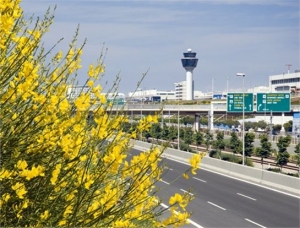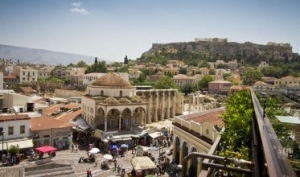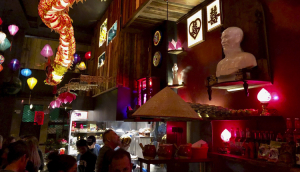XpatAthens
Magiritsa: Traditional Greek Easter Soup
Difficulty: Easy
Cooks in: 2 hours in 20 minutes
• 2 pounds of lamb or kid offal (liver, heart, lungs, and other organs)
• Intestines from 2 lambs or kids
• juice of 2 lemons
• 1 onion, finely chopped
• 5-6 green onions, finely chopped
• 1/3 cup of olive oil
• 2-3 rounded tablespoons of fresh dill, finely chopped
• 2 heads of romaine lettuce, well washed and finely chopped
• sea salt
• freshly ground black pepper
• 2 tablespoons of short-grain rice, well rinsed
For the Avgolemono (Egg & Lemon) Sauce:
• juice of 2 lemons
• 3 eggs at room temperature, separated
• 1 tablespoon of water
Greek Skies - Time Lapse Video
A time lapse video projecting the beauty of the Greek sky won the Best of the Fest award at the Hollywood International Independent Documentary Awards (HIIDA) in December.
The video maker, Panagiotis Filippou, dedicated the video to his father who died of cancer. Filippou said that it took 365 days, 55,000 photos, 825 hours shooting photos, 8400 km, 650 hours of editing and countless hours of praying in order to make this amazingly beautiful video.
We hope you love it as much as we do! For more information about the artisit, please visit his website here: http://panosphotographia.com/
Source: Tornos News
Athens Airport Goes Green & Is Hailed For Its Initiatives
To read this article in full, please visit: Greek Travel Pages
Athens Gaining Ground As Winter Destination
Winter Sales In Greece Start January 8 Through February 28
For a few ideas on where to shop, read: Athens' Newest Cool Neighborhoods - Koukaki & Makriyianni and Top 5 Places To Go In Kifissia
Madame Phu Man Chu: The Funkiest Vietnamese Restaurant In Town
Address: Skouleniou 4 & Praxitelous, Athens
Telephone: 210 3231366
Know a great restaurant? Share your review with us!
Important Tips For Using A Trailer Or Tow-Bar On Your Car In Greece
This content was originally posted on Insurance-Greece.com.
XpatAthens is grateful to Insurance-Greece for being a Silver Partner and supporting our efforts to connect and inform the international community in Greece.
Insurance-Greece is an online insurance advisory portal focused entirely on ex-pat insurance matters in Greece. They do not have call centers and never send automated email replies. An actual person deals with your insurance needs at all times. Whatever your insurance plan, an Insurance Advisor is there for personal advice! You will have an experienced insurance advisor assigned to you so you'll always have someone to talk to regarding your insurance needs. Find out more here.
11 Key Projects For Greek Tourism
More specifically, listed in the report are the following projects, investments and privatizations:
– a new cruise terminal at Piraeus port expected to be operational by 2023;
– a new marina at Alimos;
– the new Heraklion airport in Kastelli, Crete;
– the expansion of the Naxos and Chios regional airports;
– the new marina in Monolithos, Santorini;
– the privatization of a number of ports countrywide;
– the privatization of Athens International Airport;
– the upgrade and increased connectivity of the country’s train/rail network;
– modernized road networks including Crete’s North Road Axis;
– and finally, the framework for the operation of some 150 waterways.
To read this article in full, please visit: news.gtp.gr
Photo credit: thehellinikon.com
Great Theme Parks To Visit In Greece
Who does not love the exhilaration of theme parks? From your 7-year-old nephew to your 35-year-old co-worker at work, there is just something about theme parks that endears them to a multitude of visitors of all ages.
If you ask us, there isn't anything better than a family enjoying a theme park together. Luckily, Greece is home to some beautiful theme parks you can explore, try interesting activities, and spend quality time together.
Here is a small list of some great theme parks, perfect if you want to take a break from your daily routine and escape to nature for a while!
Mia fora ki enan kairo
Located just an hour from the city center, Mia Fora Ki Enan Kairo is a park surrounded by lush nature where you can get acquainted with village life and enjoy endless play! You can also have the chance to interact with various animals and practice your favorite sport! Through experiential tours, children of all ages are able to embark on a journey to a bygone era, traveling back to those nostalgic days of yesteryear when people would harmoniously coexist with nature.




From Paris To Santorini, Top Names In Sports For Santorini Experience 2024


For more information on the terms of participation, click here: https://www.santorini-experience.com/en/event-info/terms.html
The Legendary Georgios Printezis in Santorini with Joe Arlauckas!
Santorini Experience enriches this year’s schedule with the addition of the Olympic sport of basketball. For the first time in the event, two prominent sports figures, the two-time champion and EuroLeague record holder Georgios Printezis and the EuroLeague legend and European champion with Real Madrid Joe Arlauckas, join forces to teach the island’s kids the basic principles of basketball. On Sunday, October 6, children from Santorini’s basketball clubs will have the opportunity to meet these international basketball stars and learn the “secrets” of basketball at the Indoor Gymnasium Basketball Court of the Municipality of Thira.

The citizens of Thira Municipality can participate for free. Thira residents can register for free exclusively at Alafouzos Sport, the event’s Official Sports Store, at Fira in Santorini.
Those visiting Santorini by ferry for Santorini Experience can travel with the safety and comfort of Blue Star Ferries, the event’s Official Sponsor. The top Greek shipping company offers a 30% discount on ferry tickets (all seats except cabins) from Piraeus, Cyclades, and Dodecanese to Santorini on round-trip tickets and 30% on vehicles for those participating in the event and visiting the island from October 1 to 8, 2024. Each person who has completed their registration is entitled to the same discount for 3 additional people (if they are their escorts).













